Moby Dick; or, The Whale
“Shipmates, have ye shipped in that ship yet?” In 2021 I signed up for my 275th lay on the Pequod with a pandemic book club as we awaited our initial vaccines and dreamt of the watery world. These are the resulting discussion questions and agendas in Four Parts. Good for a pace of four weeks or four years! Full text of Herman Melville’s “Moby-Dick; or, The Whale” is available on Project Gutenberg.
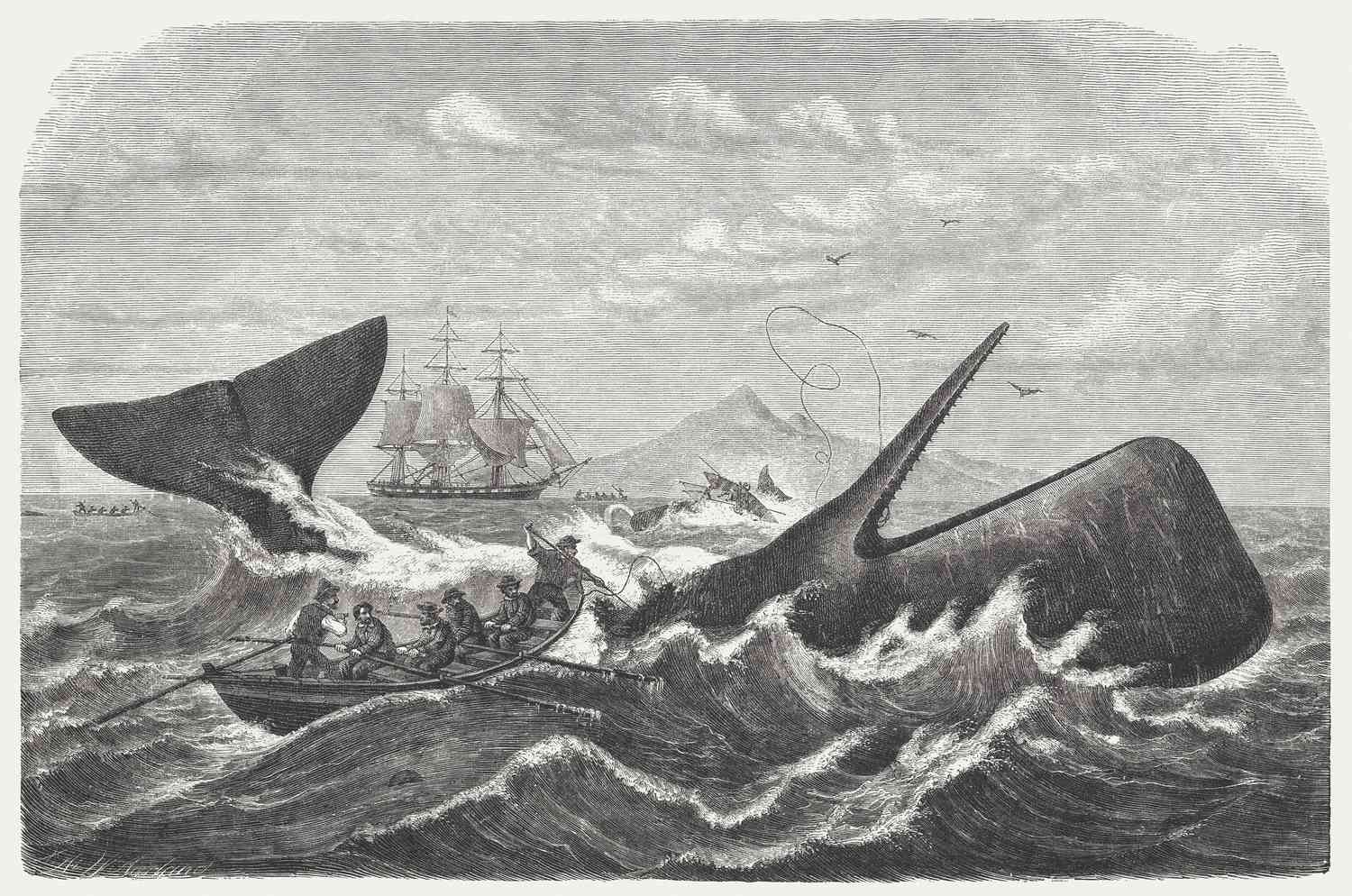
Part I
1: Loomings through 32: Cetology
As we are now fairly embarked in this business of whaling; and as this business of whaling has somehow come to be regarded among lay readers as a rather purplish poetical and daunting pursuit; therefore, I am all anxiety to convince ye, ye fellow shipmates, of the misunderstanding hereby done to us readers of “The Whale”….
PROMPTS TO CONSIDER AND DISCUSS
(Questions below adapted from ReadMoby.com)
How do you describe Ishmael’s tone of voice in the first chapter? Does he sound confident, worried, fearful, boastful? What seems to be his philosophy of life as he travels to New Bedford to ship out?
What does Herman (Ishmael) Melville [H.I.M.] say about the differences between landsmen and seamen? How does this relate to story structure?
Taking special note of the chapters 8-9 The Pulpit and The Sermon. What is the message in Brother Maple’s sermon?
What is H.I.M’s attitude toward religion and spirituality? Is there a distinction between them? What conclusion(s) has he drawn about the ideals of the Noble Savage and Christianity? What about Queequeg’s faith and spiritual beliefs? What about the Quakers (Peleg and Bildad)?
Does H.I.M. seem to believe in Free Will, Fate, or a combination of the two, such as Machiavelli supports in the closing chapter of The Prince?
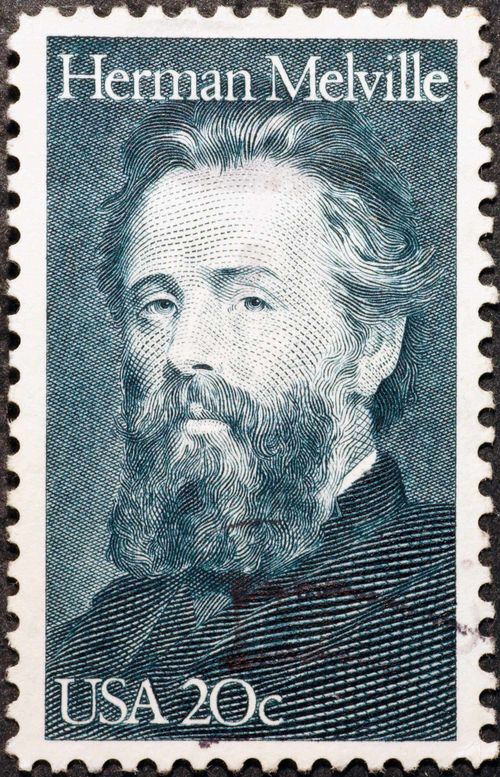
Note Melville’s purpose of Chapter 24: The Advocate. Whaling is an important undertaking, of great significance, but little general recognition. Notice his obvious passion for the subject. What modern industries have similar parallels to 19th century whaling?
The chapters 26-29 in this section review the command levels on board the ship. What do we know about the Pequod’s mates and harpooners? What of Starbuck? Stubb and Flask are, perhaps, one-dimensional while still symbolizing belief systems; what are their attitudes towards work, life, and fate?
While we hear from Peleg, Bildad, Elijah, and others about Ahab, his reveal is long coming. What do we know about Ahab’s personality and character, and what do we learn about his inner conflict(s) in Chapter 30: The Pipe?
Chapter 32: Cetology is a famous stumbling block for readers. What does this work of literary naturalism (naturalist literature?) add to the novel and reader’s experience? What remains difficult to grasp in this chapter?
BONUS: For readers who have completed The Quarter-Deck, Hark!, The Chart, and First Lowering … What do we know about the Pequod and her crew as we sight our first leviathan?
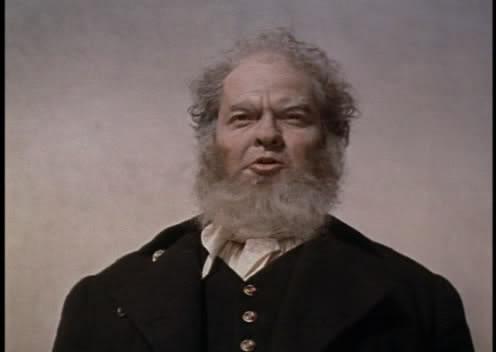
QUOTES OF NOTE
Chapter 1 The Loomings
Whenever I find myself growing grim about the mouth; whenever it is a damp, drizzly November in my soul; whenever I find myself involuntarily pausing before coffin warehouses, and bringing up the rear of every funeral I meet; and especially whenever my hypos get such an upper hand of me, that it requires a strong moral principle to prevent me from deliberately stepping into the street, and methodically knocking people’s hats off–then, I account it high time to get to sea as soon as I can. This is my substitute for pistol and ball. With a philosophical flourish, Cato throws himself upon his sword; I quietly take to the ship. …and so the universal thump is passed round, and all hands should rub each other’s shoulder-blades, and be content.
Chapter 7 The Chapel
…how it is that we still refuse to be comforted for those who we nevertheless maintain are dwelling in unspeakable bliss; why all the living so strive to hush all the dead; wherefore but the rumor of a knocking in a tomb will terrify a whole city. All these things are not without their meanings. But Faith like a jackal, feeds among the tombs, and even from these dead doubts she gathers her most vital hope.
Methinks we have hugely mistaken this matter of Life and Death. Methinks that what they call my shadow here on earth is my true substance…Methinks my body is but the lees of my better being. In fact take my body who will take it I say, it is not me.
Chapter 8 The Pulpit
…for the pulpit is ever this earth’s foremost part; all the rest comes in its rear; the pulpit leads the world.
Chapter 9 The Sermon
…if we obey God, we must disobey ourselves; and it is in this disobeying ourselves, wherein the hardness of obeying God consists.
Chapter 13 Wheelbarrow
Queequeg: It’s a mutual, joint-stock world, in all meridians. We cannibals must help these Christians.
Chapter 16 The Ship
For all men tragically great are made so through a certain morbidness. Be sure of this, O young ambition, all mortal greatness is but disease.
He’s a grand, ungodly, god-like man, Captain Ahab….
…Ahab has his humanities.
Chapter 17 The Ramadan
…Heaven have mercy on us all–Presbyterians and Pagans alike–for we are all somehow dreadfully cracked about the head, and sadly need mending.
Chapter 19 The Prophet
Elijah: “A soul’s a sort of fifth wheel to a wagon.”
Chapter 20 All Astir
…when a man suspects any wrong, it sometimes happens that if he be already involved in the matter, he insensibly strives to cover up his suspicions even from himself.
Chapter 23 The Lee Shore
…all deep, earnest thinking is but the intrepid effort of the soul to keep the open independence of her sea….
Chapter 24 The Advocate
For what are the comprehensible terrors of man compared with the interlinked terrors and wonders of God?
Chapter 26 Knights and Squires
…an utterly fearless man is a far more dangerous comrade than a coward.
Starbuck: “I will have no man in my boat who is not afraid of the whale.”
Chapter 28 Ahab
…moody stricken Ahab stood before them with a crucifixion in his face; in all the nameless regal overbearing dignity of some mighty woe.
Chapter 29 Enter Ahab; to Him, Stubb
Old age is always wakeful; as if, the longer linked with life, the less man has to do with aught that looks like death.
Chapter 32 Cetology
…But I have swam through libraries and sailed through oceans…
Part II
33: The Speksynder through 70: The Sphynx
When you finish Chapter Seventy, you are halfway through our journey. Are you a survivor, or will you jump ship? Chop wood. Carry water. Guard the watch. Paddle swiftly. Cook well the whale steak. Avoid slippery surfaces. Try and sleep soundly between the rapping of sharktails on the hull… and watch out for the wrath of superiors…
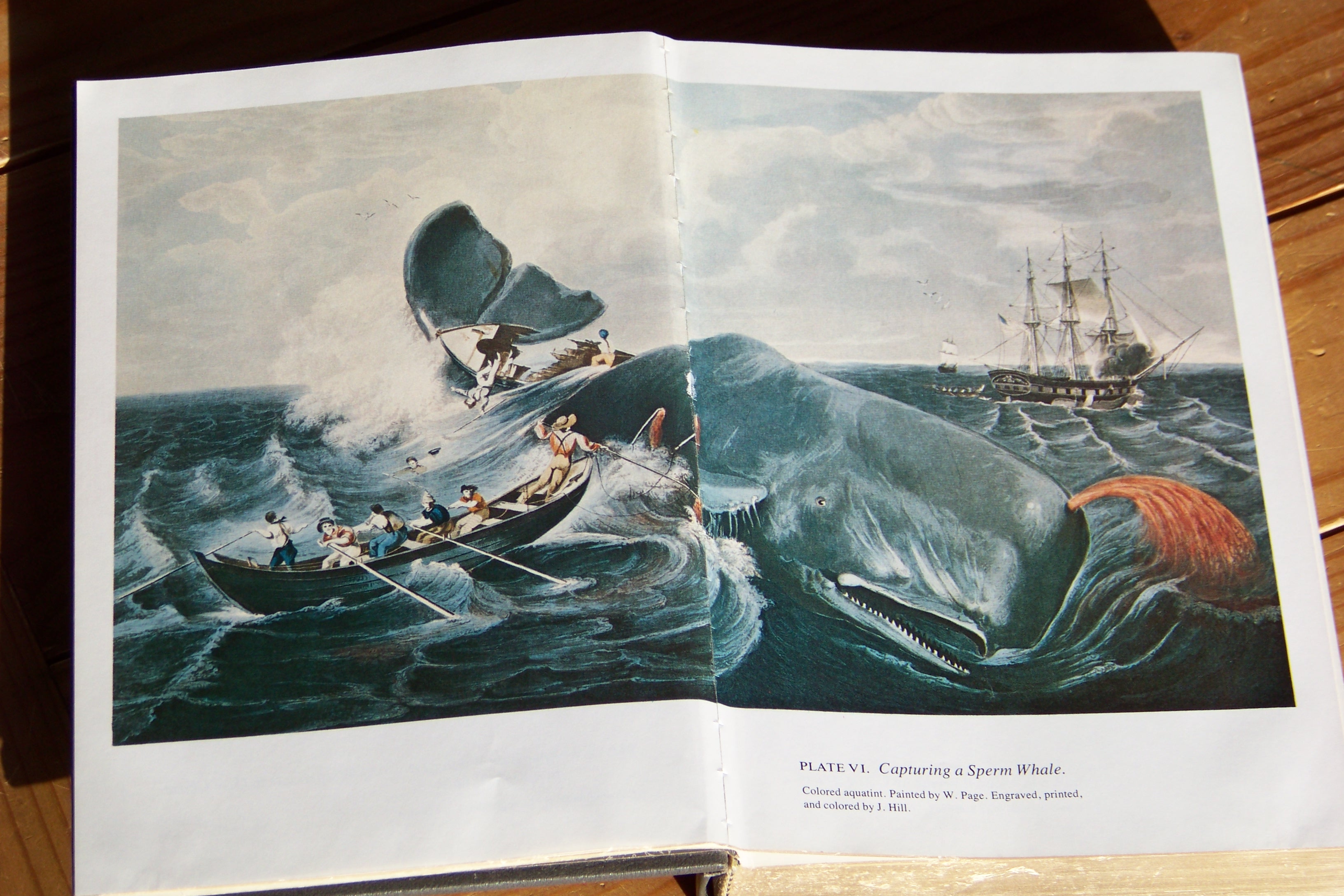
PROMPTS TO CONSIDER AND DISCUSS
Chapters 33-40 assume a dramatic structure and deepen our understanding of the Pequod’s crew and structure by revealing chorus characters (and song). What do we learn about the ship, her crew, and their opinions of Ahab’s mission? This string of chapters concludes with an “I, Ishmael…”. How do varying structures enhance the book by serving plot, theme, and symbolism?
Ch 46: Surmises, gives deeper insight into Ahab’s character and into his thinking processes. Note Ahab’s acknowledgement that he has, indeed, overstepped the boundaries of even a captain. What does he know the crew can legally do about the hunt for Moby if he does not take care to prevent it? What does he intend to do?
Ch 41: Moby-Dick is an essay within the book, encapsulating its themes and serving as a keystone for it’s structure.
Take note of Ishmael’s observation of concrete objects or sightings and his elevation of them. He will increasingly elevate concrete scenes and events. For instance, Ch 51: The Spirit-Spout, describes a real sighting that is associated with Moby Dick, then associates it with the mysteriousness of Life. In Ch 58: Brit, he realistically describes a peaceful scene of Right Whales scooping up Brit, then elevates that scene to the “full awfulness of the sea.”
Remember, Ishmael is a Romantic, a symbolist. He is no longer a landsman, who concentrates only on the “real.” Reality for a Romantic is but a mask or symbol of what lies beyond. For example, the surface of the sea itself is a “reality”; what lies hidden beneath is “truth.” Reality is paradoxical.
Ch 55: Of the Monstrous Pictures of Whales is richly referential, in the 19th-century literary tradition; here is a great resource blog containing all images referenced. “The great leviathan is that one creature in the world which must remain unpainted to the last.” The best way to see a whale, he concludes, is to go whaling. (Perhaps also the only way to observe “Brit” or “Squid”. How do these other species factor into our tail, er, tale?)
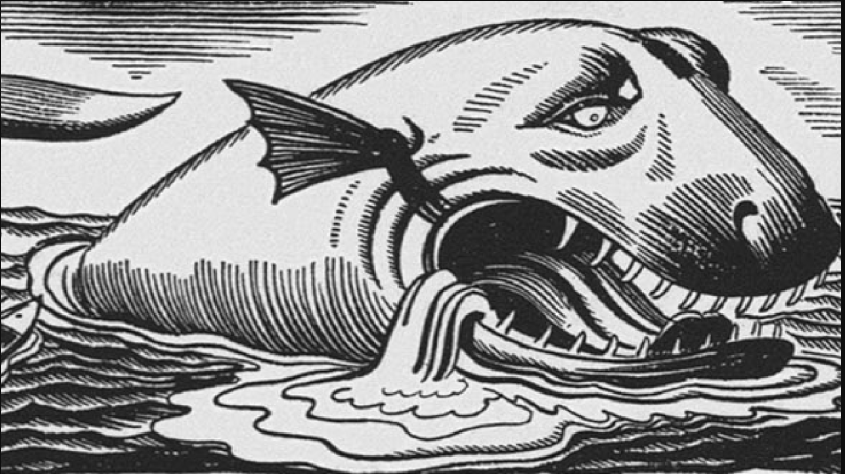
Consider Ch 66: Shark Massacre. This short chapter describes the killing of sharks in high detail. But take note of the last paragraph. It gives insight into Queequeq’s philosophy. What is it?
Ch 68: The Blanket describes the skin and blubber of the whale in great detail. Note the last paragraph–a direct elevation and application to humans. Ishmael learns from Nature:….Oh, man! admire and model thyself after the whale! Do thou too remain warm among ice…. Here are direct lessons, and Ishmael wants us to know them. This is Romanticism: We observe Nature and we learn about ourselves.
More broadly, what does this section of the book establish about the capital enterprise of whaling?
Ahab’s soliloquy in Ch 70: The Sphynx encapsulates the spiritual majesty and mystery of the whale. What does this (incredibly poetic passage) reveal about Ahab (remember, he’s been to colleges…) and man’s views on whales? How does this relate to Brother Mapple’s sermon and to the depictions of whales included in this section?
BONUS: Ch 73: Stubb and Flask kill a Right Whale; and Then Have a Talk Over Him we begin to learn of dissension in the ranks. What do the mates think of Ahab’s phantoms?
BONUS: Ch 78: Cistern and Buckets we witness Tashtego’s death/rebirth and some quintessential Queequeg Chadness.
QUOTES OF NOTE
Chapter 33: The Speksynder
(note: Speksynder, Dutch origin, means literally “fat-cutter” or “chief harpooner”)
For be a man’s intellectual superiority what it will, it can never assume the practical, available supremacy over other men, without the aid of some sort of external arts and entrenchments…. Oh, Ahab! what shall be grand in thee, it must needs be plucked at from the skies, and dived for in the deep, and featured in the unbodied air!
Chapter 34: The Cabin
Table …Ahab’s soul, shut up in the caved trunk of his body, there fed upon the sullen paws of its gloom!
Chapter 35: The Masthead
… lulled into such an opium-like listlessness of vacant, unconscious reverie is this absent-minded youth by the blending cadence of waves with thoughts, that at last he loses his identity; takes the mystic ocean at his feet for the visible image of that deep, blue, bottomless soul, pervading mankind and nature; and every strange, half-seen, gliding, beautiful thing that eludes him; every dimly-discovered, uprising fin of some undiscernible form, seems to him the embodiment of those elusive thoughts that only people the soul by continually flitting through it. In this enchanted mood, thy spirit ebbs away to whence it came; becomes diffused through time and space; like Cranmer’s sprinkled Pantheistic ashes, forming at last a part of every shore the round globe over. There is no life in thee, now, except that rocking life imparted by a gently rolling ship; by her, borrowed from the sea; by the sea, from the inscrutable tides of God. But while this sleep, this dream is on ye, move your foot or hand an inch; slip your hold at all; and your identity comes back in horror. Over Descartian vortices you hover. And perhaps, at mid-day, in the fairest weather, with one half-throttled shriek you drop through that transparent air into the summer sea, no more to rise for ever. Heed it well, ye Pantheists!
Chapter 36: The Quarter-Deck
“D’ye mark him, Flask?” whispered Stubb; “the chick that’s in him pecks the shell. T’will soon be out.” “Vengeance on a dumb brute!” cried Starbuck, “that simply smote thee from blindest instinct! Madness! To be enraged with a dumb thing, Captain Ahab, seems blasphemous.” All visible objects, man, are but as pasteboard masks…If a man will strike, strike through the mask! (Ahab). Talk not to me of blasphemy, man; I’d strike the sun if it insulted me (Ahab). Who’s over me? Truth hath no confines (Ahab).
Chapter 37: Sunset
Ahab: Gifted with high perception, I lack the low, enjoying power; damned, most subtly and most malignantly! damned in the midst of Paradise!
Ahab: Oh, hard! that to fire others, the match itself must needs be wasting!
Ahab: What I’ve dared, I’ve willed; and what I’ve willed, I’ll do!
Chapter 38: Dusk
Starbuck: Oh, life! ‘tis in an hour like this, with soul beat down and held to knowledge, -as wild, untutored things are forced to feed-Oh, life! ‘tis now that I do feel the latent horror in thee!
Chapter 39: First Night-Watch
Stubb: HA! ha! ha! ha! hem! clear my throat!–I’ve been thinking over it ever since, and that ha, HA’s the final consequence. Why so? Because a laugh’s the wisest, easiest answer to all that’s queer; and come what will, one comfort’s always left–that unfailing comfort is, it’s all predestinated.
Stubb: I know not all that may be coming, but be it what it will, I’ll go to it laughing.
Chapter 40: Midnight, Forecastle
Pip: Oh, thou big white God aloft there somewhere in yon darkness, have mercy on this small black boy down here; preserve him from all men that have no bowels to feel fear!
Chapter 41: Moby Dick
I, Ishmael, was one of that crew; my shouts had gone up with the rest; my oath had been welded with theirs; and stronger I shouted, and more did I hammer and clinch my oath, because of the dread in my soul. A wild, mystical, sympathetical feeling was in me; Ahab’s quenchless feud seemed mine. …immortality is but ubiquity in time… …all this to explain, would be to dive deeper than Ishmael can go. The subterranean miner that works in us all, how can one tell whither leads his shaft by the ever shifting, muffled sound of his pick? Who does not feel the irresistible arm drag? What skiff in tow of a seventy-four can stand still? For one, I gave myself up to the abandonment of the time and the place; but while yet all a-rush to encounter the whale, could see naught in that brute but the deadliest ill.
Chapter 42: The Whiteness of the Whale
Though in many of its aspects this visible world seems formed in love, the invisible spheres were formed in fright. …all deified Nature absolutely paints like the harlot, whose allurements cover nothing but the charnel-house within…
(467 word sentence) “Though in many natural objects, whiteness refiningly enhances beauty, as if imparting some special virtue of its own, as in marbles, japonicas, and pearls; and though various nations have in some way recognized a certain royal preeminence in this hue; even the barbaric, grand old kings of Pegu placing the title “Lord of the White Elephants” above all their other magniloquent ascriptions of dominion; and the modern kings of Siam unfurling the same snow-white quadruped in the royal standard; and the Hanoverian flag bearing the one figure of a snow-white charger; and the great Austrian Empire, Caesarian, heir to overlording Rome, having for the imperial color the same imperial hue; and though this pre-eminence in it applies to the human race itself, giving the white man ideal mastership over every dusky tribe; and though, besides all this, whiteness has been even made significant of gladness, for among the Romans a white stone marked a joyful day; and though in other mortal sympathies and symbolizings, this same hue is made the emblem of many touching, noble things- the innocence of brides, the benignity of age; though among the Red Men of America the giving of the white belt of wampum was the deepest pledge of honor; though in many climes, whiteness typifies the majesty of Justice in the ermine of the Judge, and contributes to the daily state of kings and queens drawn by milk-white steeds; though even in the higher mysteries of the most august religions it has been made the symbol of the divine spotlessness and power; by the Persian fire worshippers, the white forked flame being held the holiest on the altar; and in the Greek mythologies, Great Jove himself being made incarnate in a snow-white bull; and though to the noble Iroquois, the midwinter sacrifice of the sacred White Dog was by far the holiest festival of their theology, that spotless, faithful creature being held the purest envoy they could send to the Great Spirit with the annual tidings of their own fidelity; and though directly from the Latin word for white, all Christian priests derive the name of one part of their sacred vesture, the alb or tunic, worn beneath the cassock; and though among the holy pomps of the Romish faith, white is specially employed in the celebration of the Passion of our Lord; though in the Vision of St. John, white robes are given to the redeemed, and the four-and-twenty elders stand clothed in white before the great-white throne, and the Holy One that sitteth there white like wool; yet for all these accumulated associations, with whatever is sweet, and honorable, and sublime, there yet lurks an elusive something in the innermost idea of this hue, which strikes more of panic to the soul than that redness which affrights in blood.”
Chapter 44: The Chart
God help thee, old man, thy thoughts have created a creature in thee; and he whose intense thinking thus makes him a Prometheus; a vulture feeds upon that heart for ever; that vulture the very creature he creates.
Chapter 49: The Hyena
There are certain queer times and occasions in this strange mixed affair we call life when a man takes this whole universe for a vast practical joke, though the wit thereof he but dimly discerns, and more than suspects that the joke is at nobody’s expense but his own.
Chapter 53: The Albatross
But in pursuit of those far mysteries we dream of, or in tormented chase of that demon phantom that, some time or other, swims before all human hearts; while chasing such over this round globe, they either lead us on in barren mazes or midway leave us whelmed.
Chapter 54: The Town Ho’s Story
Now, as you well know, it is not seldom the case in this conventional world of ours– watery or otherwise; that when a person placed in command over his fellow-men finds one of them to be very significantly his superior in general pride of manhood, straightway against that man he conceives an unconquerable dislike and bitterness; and if he have a chance he will pull down and pulverize that subaltern’s tower, and make a little heap of dust of it.
Chapter 59: Brit
…as this appalling ocean surrounds the verdant land, so in the soul of man there lies one insular Tahiti, full of peace and joy, but encompassed by all the horrors of the half known life. God keep thee! Push not off from that isle, thou canst never return!
Chapter 61: The Line
All men live enveloped in whale-lines. All are born with halters round their necks; but it is only when caught in the swift, sudden turn of death, that mortals realize the silent, subtle, ever-present perils of life.
Chapter 63: The Dart
To insure the greatest efficiency in the dart, the harpooneers of this world must start to their feet from out of idleness, and not from out of toil.
Chapter 64: Stubb’s Supper
Once more the sermon proceeded.
“Your woraciousness, fellow-critters, I don’t blame ye so much for; dat is natur, and can’t be helped; but to gobern dat wicked natur, dat is de pint. You is sharks, sartin; but if you gobern de shark in you, why den you be angel; for all angel is not’ing more dan de shark well goberned. Now, look here, bred’ren, just try wonst to be cibil, a helping yourselbs from dat whale. Don’t be tearin’ de blubber out your neighbour’s mout, I say. Is not one shark dood right as toder to dat whale? And, by Gor, none on you has de right to dat whale; dat whale belong to some one else. I know some o’ you has berry brig mout, brigger dan oders; but den de brig mouts sometimes has de small bellies; so dat de brigness of de mout is not to swaller wid, but to bit off de blubber for de small fry ob sharks, dat can’t get into de scrouge to help demselves.”
“Well done, old Fleece!” cried Stubb, “that’s Christianity; go on.”
Chapter 66: Shark Massacre
“Queequeg no care what god made him shark,” said the savage, agonizingly lifting his hand up and down; “wedder Fejee god or Nantucket god; but de god wat made shark must be one dam Ingin.”
Chapter 68: The Blanket
Oh, man! admire and model thyself after the whale! Do thou, too, remain warm among ice. Do thou, too, live in this world without being of it. Be cool at the equator; keep thy blood fluid at the Pole. Like the great dome of St. Peter’s, and like the great whale, retain, O man! in all seasons a temperature of thine own.
Chapter 70: The Sphynx
It was a black and hooded head; and hanging there in the midst of so intense a calm, it seemed the Sphynx’s in the desert. “Speak, thou vast and venerable head,” muttered Ahab, “which, though ungarnished with a beard, yet here and there lookest hoary with mosses; speak, mighty head, and tell us the secret thing that is in thee. Of all divers, thou hast dived the deepest. That head upon which the upper sun now gleams, has moved amid this world’s foundations. Where unrecorded names and navies rust, and untold hopes and anchors rot; where in her murderous hold this frigate earth is ballasted with bones of millions of the drowned; there, in that awful water-land, there was thy most familiar home. Thou hast been where bell or diver never went; hast slept by many a sailor’s side, where sleepless mothers would give their lives to lay them down. Thou saw’st the locked lovers when leaping from their flaming ship; heart to heart they sank beneath the exulting wave; true to each other, when heaven seemed false to them. Thou saw’st the murdered mate when tossed by pirates from the midnight deck; for hours he fell into the deeper midnight of the insatiate maw; and his murderers still sailed on unharmed—while swift lightnings shivered the neighboring ship that would have borne a righteous husband to outstretched, longing arms. O head! thou hast seen enough to split the planets and make an infidel of Abraham, and not one syllable is thine!”
Part III
Ch 71: The Jerobaum’s Story through 99: The Doubloon
We have sailed many thousands of miles and encountered our share of mysteries! No sign of the White Leviathan. The captain has equally so been scarce for twenty-nine chapters. Laplandish speculations are bandied aboard in regularity. Who among us is possessed? Hath ye glimpsed God’s foot upon the treadle of the loom, uncoiling His grand authorship? Findest thyself, dear reader, a Fast-Fish or a Loose-Fish? No way out but through….
PROMPTS TO CONSIDER AND DISCUSS:
The Gam reviews gams. Ch 71: The Jeroboam’s Story (Gabriel and the plague-riddled Nantucketers), Ch 81: The Pequod Meets The Virgin (Derick and the Germans), and Ch 91: The Pequod Meets The Rose-Bud (Stubb the confidence man tricks the Crappoes). How is Gabriel’s angelic mission contrasted from Ahab? Who is madder? What do we learn about whales and Stubb in his pursuit of ambergris? “Oh! many are the Fin-Backs, and many are the Dericks, my friend.”
Stubb and Flask, following Ahab’s queer instruction to hunt a Right Whale, steer their boats back to the Pequod free of surveillance from Ahab and share a few private words regarding the Phantom crew in Ch 73: Stubb and Flask…, who does Stubb think Fedallah is? How convinced is Third Mate Flask? What do you make of Stubb’s attitude toward Fedallah? (PS what is Melville really saying about Locke and Kant?)
Our noble Chad Queequeg once again takes center stage in Ch 72: The Monkey-Rope and Ch 78: Cistern and Buckets. Has H.I.M. and Queequeg’s bond grown aboard the ship? “Joint-stock” isn’t very romantic. Melville never breaks the golden rule of horror: use it or lose it. Tashtego experiences a rebirth with heroic Queequeg as his dutiful midwife.
Stubb emerges as the embodiment of caustic capitalistic greed - we see a great deal of Stubb since First Lowering (and scarcer mention of Starbuck!). Stubb abuses the Cook during his Supper. He discards Aunt Charity’s ginger-jub for grog. He gleefully chases off The Virgin and mocks the crippled whale that is to be their (temporary) prey. In lustful greed he tricks the Rose-Bud into casting off a blasted whale to mine ambergris. After cutting the line once for Poor tangled Pip (“a whale would sell for thirty times what you would, Pip, in Alabama”), he thereafter leaves him alone in the wide open ocean for hours. How do Stubb’s schemes differ from Ahab’s and Starbuck’s? (What can we say of Flask through this section?)
“Some of the subtlest secrets of the seas seemed divulged to us in this enchanted pond” depicted in Ch 87: The Grand Armada, where structure and style collide. While we may find ourselves “fast fished” to the gory drudgery of dismembering whales, we are also embarked upon a magical cosmological journey observing sperm whale spawning grounds, giant squid breach the surface, and acres of luminescent brit through all the houses of the Zodiac (Ch 99: The Doubloon). What secrets of the seas have ye observed in thyself, dear reader?
H.I.M. dabbles in the letters of law and philosophy in Ch 89: Fast-Fish and Loose-Fish. Are you sufficiently dispossessed of your landlubbing to abide by the watery rule of law? What is H.I.M. really saying about mid-19th century racism and colonialism through characters aboard the Pequod and historically referenced? What does it mean that this weird bleak novel is an American classic?
Ch 96: The Try-Works is the hellish heart of the Pequod, burning bible leaves of blubber in the iron pots affixed to the sturdiest part of the main deck. “Then the rushing Pequod, freighted with savages, and laden with fire, and burning a corpse, and plunging into that blackness of darkness, seemed the material counterpart of her monomaniac commander’s soul.” H.I.M. hallucinates and almost capsizes the boat. Are we having fun yet?
BONUS Ch 90: Heads or Tails has a wonderful Bartleby parallel: “It is his.”
BONUS Ch 94: A Squeeze of the Hand. Um, are we sure this book is about whales?
BONUS Ch 99: The Dubloon. Recalling Borges “The Zahir” (“Perhaps I will succeed in wearing away the Zahir by thinking and re-thinking about it; perhaps behind the coin is God.”), we gain insights into Ahab, Starbuck, Stubb and Pip as they mull the mast’s obol. What do they think of the celestial bodies, vice districts, heaven and hell?
BONUS Symbolism check-in…at this point what doesn’t the whale represent?
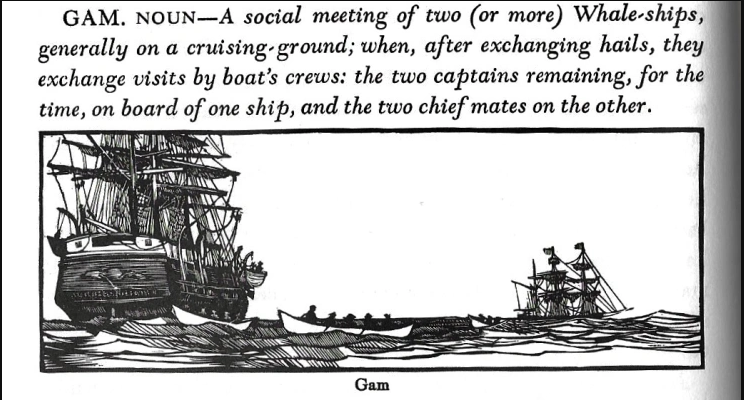
QUOTES OF NOTE:
Chapter 72: The Monkey-Rope
…I seemed distinctly to perceive that my own individuality was now merged in a joint stock company of two: that my free will had received a mortal wound; and that another’s mistake or misfortune might plunge innocent me into unmerited disaster and death.
Chapter 73: Stubb and Flask Kill a Right Whale; and Then Have a Talk Over Him
“How old do you suppose Fedallah is, Stubb?”
“Do you see that mainmast there?” pointing to the ship; “well, that’s the figure one; now take all the hoops in the Pequod’s hold, and string along in a row with that mast, for oughts, do you see; well, that wouldn’t begin to be Fedallah’s age. Nor all the coopers in creation couldn’t show hoops enough to make oughts enough.”
So, when on one side you hoist in Locke’s head, you go over that way; but now, on the other side, hoist in Kant’s and you come back again; but in very poor plight. Thus, some minds for ever keep trimming boat. Oh, ye foolish! throw all these thunderheads overboard, and then you will float light and right.
Chapter 74: The Sperm Whale’s Head–Contrasted View
The whale, therefore, must see one distinct picture on this side, and another distinct picture on that side; while all between must be profound darkness and nothingness to him. Is it not curious, that so vast a being as the whale should see the world through so small an eye, and hear the thunder through an ear which is smaller than a hare’s? But if his eyes were broad as the lens of Herschel’s great telescope; and his ears capacious as the porches of cathedrals; would that make him any longer of sight, or sharper of hearing? Not at all.–Why then do you try to “enlarge” your mind? Subtilize it.
Chapter 79: The Prairie
I try all things; I achieve what I can.
Chapter 80: The Nut
The whale, like all things that are mighty, wears a false brow to the common world. For I believe that much of a man’s character will be found betokened in his backbone. I would rather feel your spine than your skull, whoever you are. A thin joist of a spine never yet upheld a full and noble soul.
Chapter 81: The Pequod Meets The Virgin
But pity there was none. For all his old age, and his one arm, and his blind eyes, he must die the death and be murdered, in order to light the gay bridals and other merry-makings of men, and also to illuminate the solemn churches that preach unconditional inoffensiveness by all to all. Still rolling in his blood, at last he partially disclosed a strangely discoloured bunch or protuberance, the size of a bushel, low down on the flank.
Chapter 85: The Fountain
Doubts of all things earthly, and intuitions of some things heavenly; this combination makes neither believer nor infidel, but makes a man who regards them both with equal eye.
Chapter 86: The Tail
Five great motions are peculiar to it. First, when used as a fin for progression; Second, when used as a mace in battle; Third, in sweeping; Fourth, in lobtailing; Fifth, in peaking flukes.
Real strength never impairs beauty or harmony, but it often bestows it; and in everything imposingly beautiful, strength had much to do with the magic.
Chapter 87: The Grand Armada
…withhold any amazement at the strangely galled whales before us, for there is no folly of the beasts of the earth which is not infinitely outdone by the madness of men.
As when the stricken whale, that from the tub has reeled out hundreds of fathoms of rope; as, after deep sounding, he floats up again, and shows the slackened curling line buoyantly rising and spiralling towards the air; so now, Starbuck saw long coils of the umbilical cord of Madame Leviathan, by which the young cub seemed still tethered to its dam. Not seldom in the rapid vicissitudes of the chase, this natural line, with the maternal end loose, becomes entangled with the hempen one, so that the cub is thereby trapped. Some of the subtlest secrets of the seas seemed divulged to us in this enchanted pond. We saw young Leviathan amours in the deep.
…amid the tornadoed Atlantic of my being, do I myself still for ever centrally disport in mute calm; and while ponderous planets of unwaning woe revolve round me, deep down and deep inland there I still bathe me in eternal mildness of joy.
Chapter 89: Fast-Fish and Loose-Fish
I. A Fast-Fish belongs to the party fast to it.
II. A Loose-Fish is fair game for anybody who can soonest catch it.
What are the sinews and souls of Russian serfs and Republican slaves but Fast-Fish, whereof possession is the whole of the law?……
What is the ruinous discount which Mordecai, the broker, gets from poor Woebegone, the bankrupt, on a loan to keep Woebegone’s family from starvation; what is that ruinous discount but a Fast-Fish? What is the Archbishop of Savesoul’s income of £100,000 seized from the scant bread and cheese of hundreds of thousands of broken-backed laborers (all sure of heaven without any of Savesoul’s help) what is that globular £100,000 but a Fast-Fish? What are the Duke of Dunder’s hereditary towns and hamlets but Fast-Fish? What to that redoubted harpooneer, John Bull, is poor Ireland, but a Fast-Fish? What to that apostolic lancer, Brother Jonathan, is Texas but a Fast-Fish? And concerning all these, is not Possession the whole of the law?
… What was America in 1492 but a Loose-Fish…? What are the Rights of Man and the Liberties of the World but Loose-Fish? What all men’s minds and opinions but Loose-Fish?
… And what are you, reader, but a Loose-Fish and a Fast-Fish, too?
Chapter 91: The Pequod Meets The Virgin
“I have it, I have it,” cried Stubb, with delight, striking something in the subterranean regions, “a purse! a purse!”
Dropping his spade, he thrust both hands in, and drew out handfuls of something that looked like ripe Windsor soap, or rich mottled old cheese; very unctuous and savory withal. You might easily dent it with your thumb; it is of a hue between yellow and ash colour. And this, good friends, is ambergris, worth a gold guinea an ounce to any druggist. Some six handfuls were obtained; but more was unavoidably lost in the sea, and still more, perhaps, might have been secured were it not for impatient Ahab’s loud command to Stubb to desist, and come on board, else the ship would bid them good bye.
Chapter 93: The Castaway
The sea had jeeringly kept his finite body up, but drowned the infinite of his soul. Not drowned entirely, though. Rather carried down alive to wondrous depths, where strange shapes of the unwarped primal world glided to and fro before his passive eyes; and the miser-merman, Wisdom, revealed his hoarded heaps; and among the joyous, heartless, ever-juvenile eternities, Pip saw the multitudinous, God-omnipresent, coral insects, that out of the firmament of waters heaved the colossal orbs. He saw God’s foot upon the treadle of the loom, and spoke it; and therefore his shipmates called him mad. So man’s insanity is heaven’s sense; and wandering from all mortal reason, man comes at last to that celestial thought, which, to reason, is absurd and frantic; and weal or woe, feels then uncompromised, indifferent as his God.
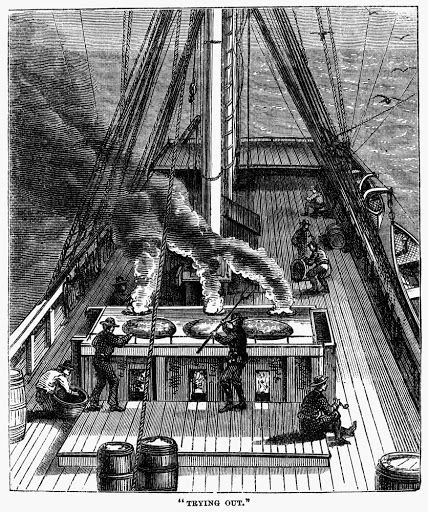
Chapter 96: The Try-Works
As they narrated to each other their unholy adventures, their tales of terror told in words of mirth; as their uncivilized laughter forked upwards out of them, like the flames from the furnace; as to and fro, in their front, the harpooneers wildly gesticulated with their huge pronged forks and dippers; as the wind howled on, and the sea leaped, and the ship groaned and dived, and yet steadfastly shot her red hell further and further into the blackness of the sea and the night, and scornfully champed the white bone in her mouth, and viciously spat round her on all sides; then the rushing Pequod, freighted with savages, and laden with fire, and burning a corpse, and plunging into that blackness of darkness, seemed the material counterpart of her monomaniac commander’s soul.
Convulsively my hands grasped the tiller, but with the crazy conceit that the tiller was, somehow, in some enchanted way, inverted. My God! what is the matter with me? thought I. Lo! in my brief sleep I had turned myself about, and was fronting the ship’s stern, with my back to her prow and the compass. In an instant I faced back, just in time to prevent the vessel from flying up into the wind, and very probably capsizing her. How glad and how grateful the relief from this unnatural hallucination of the night, and the fatal contingency of being brought by the lee!
Look not too long in the face of the fire, O man! Never dream with thy hand on the helm!
There is a wisdom that is woe; but there is a woe that is madness. And there is a Catskill eagle in some souls that can alike dive down into the blackest gorges, and soar out of them again and become invisible in the sunny spaces. And even if he for ever flies within the gorge, that gorge is in the mountains; so that even in his lowest swoop the mountain eagle is still higher than other birds upon the plain, even though they soar.
Chapter 99: The Doubloon
And some certain significance lurks in all things, else all things are little worth…
AHAB: “There’s something ever egotistical in mountain-tops and towers, and all other grand and lofty things; look here,—three peaks as proud as Lucifer. The firm tower, that is Ahab; the volcano, that is Ahab; the courageous, the undaunted, and victorious fowl, that, too, is Ahab; all are Ahab;…. Born in throes, ‘t is fit that man should live in pains and die in pangs! So be it, then! Here’s stout stuff for we to work on. So be it, then.
STARBUCK: “No fairy fingers can have pressed the gold, but devil’s claws must have left their mouldings there since yesterday,” murmured Starbuck to himself, leaning against the bulwarks. “The old man seems to read Belshazzar’s awful writing. I have never marked the coin inspectingly. He goes below; let me read. A dark valley between three mighty, heaven-abiding peaks, that almost seem the Trinity, in some faint earthly symbol.
STUBB: And all from looking at a piece of gold, which did I have it now on Negro Hill or in Corlaer’s Hook, I’d not look at it very long ere spending it.
PIP: “And I, you, and he; and we, ye, and they, are all bats; and I’m a crow, especially when I stand a’top of this pine tree here. Caw! caw! caw! caw! caw! caw! Ain’t I a crow? And where’s the scare-crow? There he stands; two bones stuck into a pair of old trowsers, and two more poked into the sleeves of an old jacket.”
Part IV
[to be concluded….]
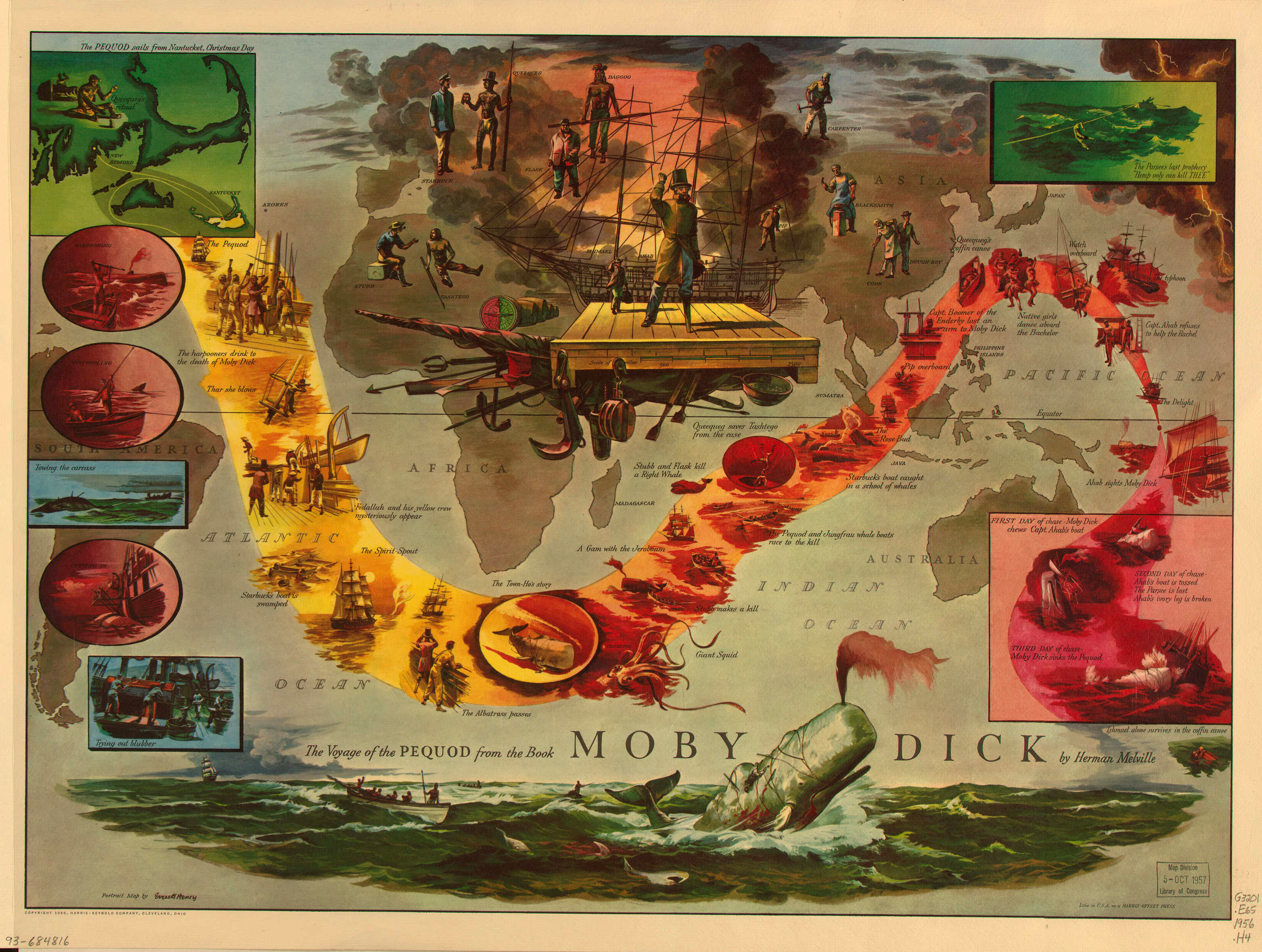
The scraps are scarce from Ishmael’s coffin……